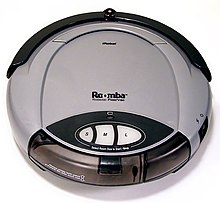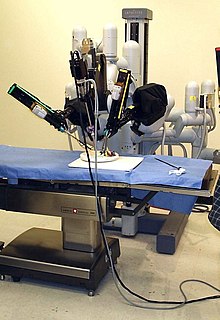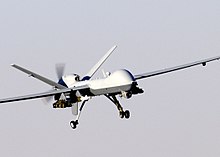
Robots of the United States include simple household robots such as Roomba to sophisticated autonomous aircraft such as the MQ-9 Reaper that cost 18 million dollars per unit. The first industrial robot, robot company, and exoskeletons as well as the first dynamically balancing, organic, and nanoscale robots originate from the United States.
History

In 1898 Nikola Tesla publicly demonstrated a radio-controlled torpedo. Based on patents for "teleautomation", Tesla hoped to develop it into a weapon system for the US Navy.
In 1926, Westinghouse Electric Corporation created Televox, the first robot put to useful work. In the 1930s, they created a humanoid robot known as Elektro for exhibition purposes, including the 1939 and 1940 World's Fairs.
Unimate was the first industrial robot, which worked on a General Motors assembly line in New Jersey in 1961. It was created by George Devol in the 1950s using his original patents. Devol, together with Joseph F. Engelberger started Unimation, the world's first robot manufacturing company.
In 2008 the U.S. Air Force 174th Fighter Wing transitioned from F-16 piloted planes to MQ-9 Reaper drones, which are capable remote controlled or autonomous flight, becoming the first all-robot attack squadron.
Modern robots






Domestic
Main article: Domestic robot- PatrolBot a configurable guide/delivery/surveillance robot
- Roomba a vacuum cleaner
- Scooba a floor washer
- Looj a rain gutter cleaner
Entertainment
Extraterrestrial
- ATHLETE lunar rover
- Mars Exploration Rover
Medical
Main article: Robotic surgeryMilitary (offensive/multi-role)
Main article: Military robotAerial
Terrestrial
- Black Knight unmanned tank
- Gladiator tactical unmanned ground vehicle
- MarkV-A1
- MULE / XM1219
- PackBot / SUGV
- TALON
Military (non-offensive)
Aerial
Terrestrial
- ACER
- Battlefield Extraction-Assist Robot
- BigDog dynamically balancing quadruped
- Crusher
- Dragon Runner
- MATILDA
Nanoscale
Main article: NanoroboticsWalker
Main article: Walker (machine)- BigDog dynamically balancing quadruped
- Anybots Dexter, the first dynamically balancing biped
- Timberjack Walking Machine logger
Non-autonomous (human operated)
These machines are human operated and not autonomous. Therefore, they do fit the classical description of a robot.
Exoskeleton
Main article: Powered exoskeleton- Berkeley Lower Extremity Exoskeleton
- Sarcos/Raytheon XOS Exoskeleton, currently the most advanced exoskeleton, research for the XOS is funded by DARPA and NIST for use in the military and to "replace the wheelchair".
Military
Research
- Tufts University morphing chemical robot Tufts to develop morphing 'chemical robots'
Software
Main article: Robotics suite- Microsoft Robotics Studio - .NET based
- VxWorks - operating system, notably used by ASIMO
- Robot App Store - Apps for every robot
American robotics companies
- Anybots
- Barrett Technology
- Berkshire Grey
- Bluefin Robotics
- Boston Dynamics
- Brooks Automation
- Cobalt Robotics
- Cobot Nation
- Diligent Robotics
- Energid Technologies
- Evolution Robotics
- Fetch Robotics
- Foster-Miller
- Harvest Automation
- Hydroid
- Inspectorbots
- Intuitive Surgical
- iRobot
- Kiva Systems
- Locus Robotics
- Mitsubishi Electric Automation - Robotics
- Myomo (myoelectric prosthetics)
- Rethink Robotics
- Savioke
- SuperDroid Robots
- Vecna Robotics
- Vishwa Robotics
- Willow Garage
See also
- Japanese robotics
- Robots in warfare
- Shadow Hand British Robotics company
- Underwater robot
- Drone
- Terminator, movie about and artificial intelligence
References
- Reminiscing on the Roomba
- ^ The Rise Of The Droids
- ^ Nof, Shimon Y. (1999). Handbook of Industrial Robotics (2nd ed.). John Wiley & Sons. pp. 3–5. ISBN 978-0-471-17783-8.
- ^ 1961: The First Robot
- A Brief History of Exoskeletons
- Smallest Robot Archived December 9, 2008, at the Wayback Machine
- Cheney, Margaret (1989). Tesla, man out of time. New York: Dorset Press. ISBN 978-0-88029-419-5.
- US 613809, Tesla, Nikola, "Method of and apparatus for controlling mechanism of moving vessels or vehicles", published 1898-11-08
- "Tesla - Master of Lightning". PBS.org. Archived from the original on 28 September 2008. Retrieved 2008-09-24.
- "Robot Dreams : The Strange Tale Of A Man's Quest To Rebuild His Mechanical Childhood Friend". The Cleveland Free Times. Archived from the original on October 23, 2007. Retrieved 2008-09-25.
- Scott Schaut (2006). Robots of Westinghouse: 1924-Today. Mansfield Memorial Museum.
- 1961: Installation of the First Industrial Robot
- Menzel, Peter; Faith D'Aluisio (2000). Robo sapiens: evolution of a new species. The MIT Press. pp. 186–189. ISBN 978-0-262-13382-1.
- MQ-9 Reaper
- Unmanned Reapers bound for Iraq, Afghanistan
- Dexter Walks
- Building the Real Iron Man
- Building the Real Iron Man
External links
| Robotics | ||
|---|---|---|
| Main articles |  | |
| Types | ||
| Classifications | ||
| Locomotion | ||
| Navigation and mapping | ||
| Research | ||
| Companies | ||
| Related | ||